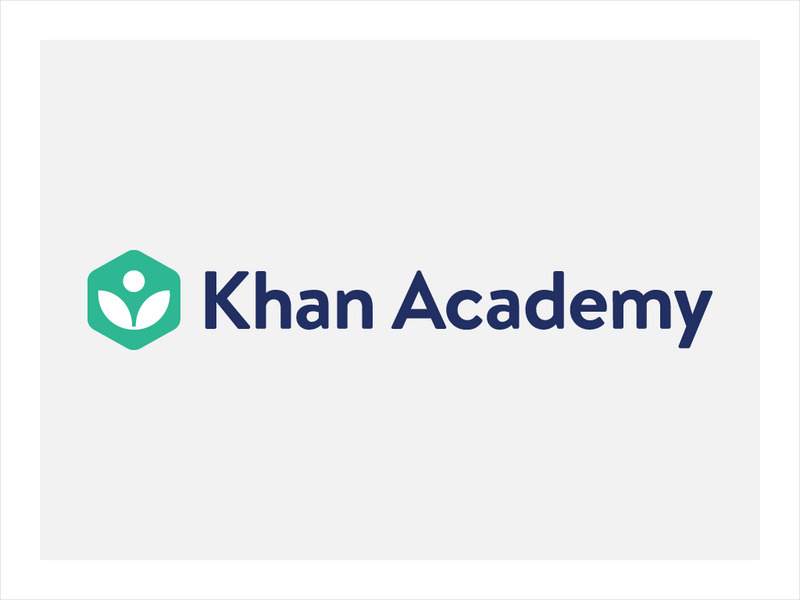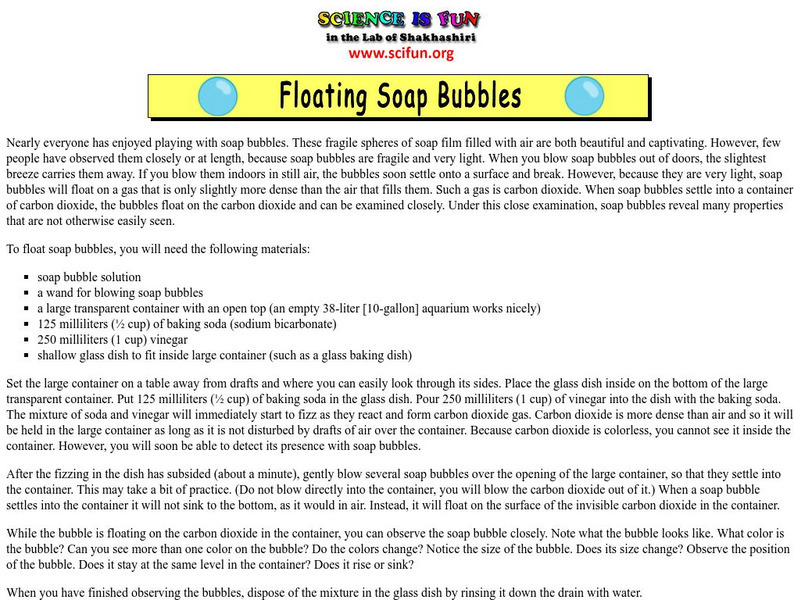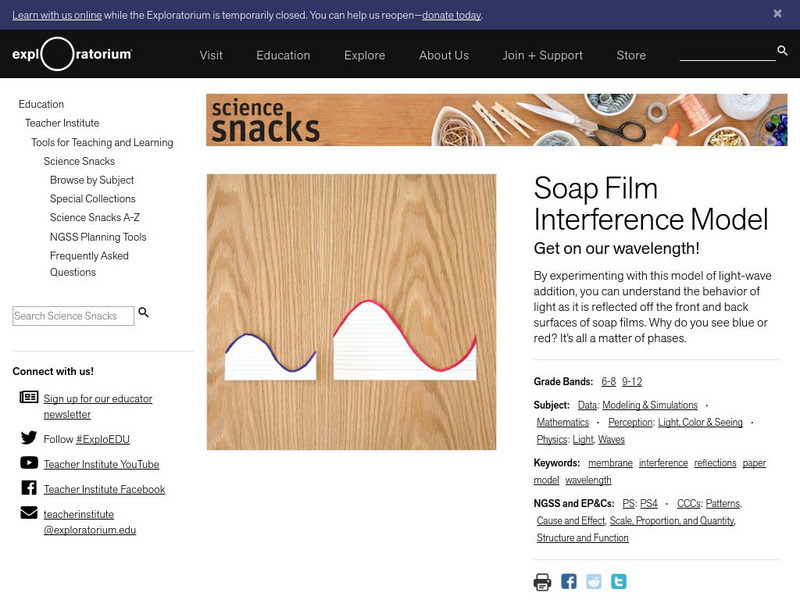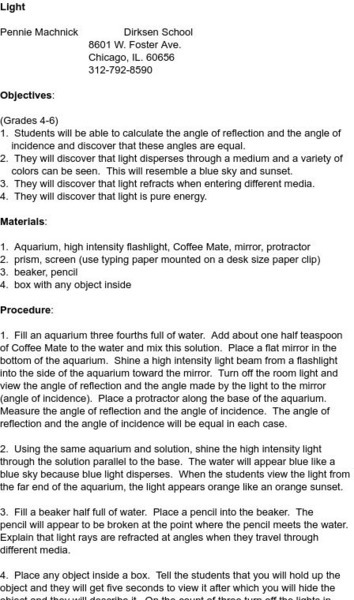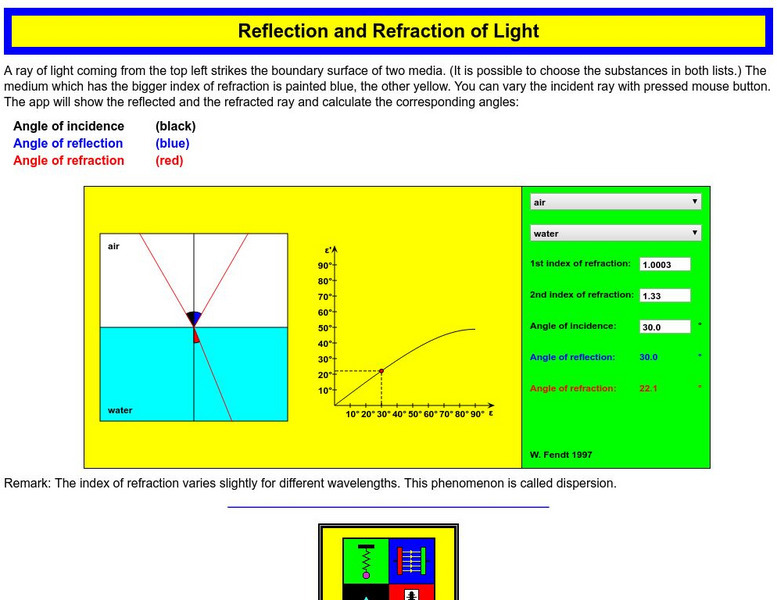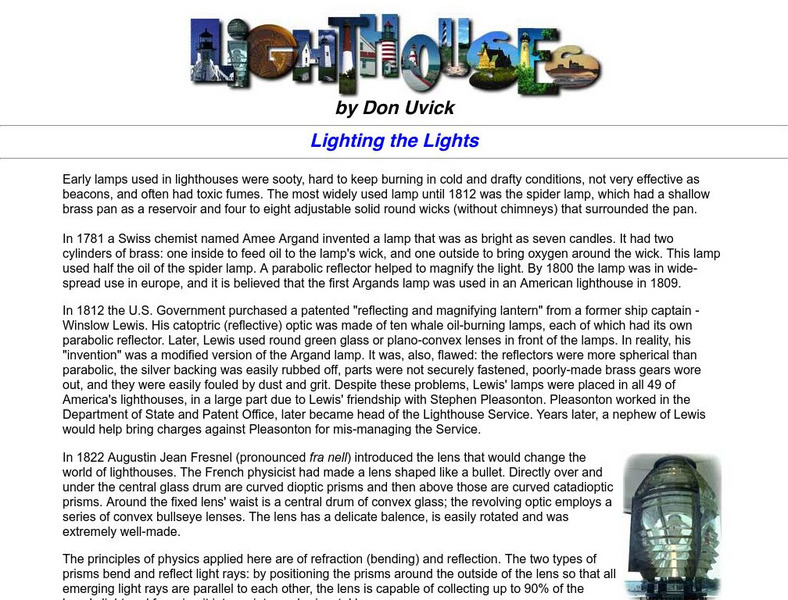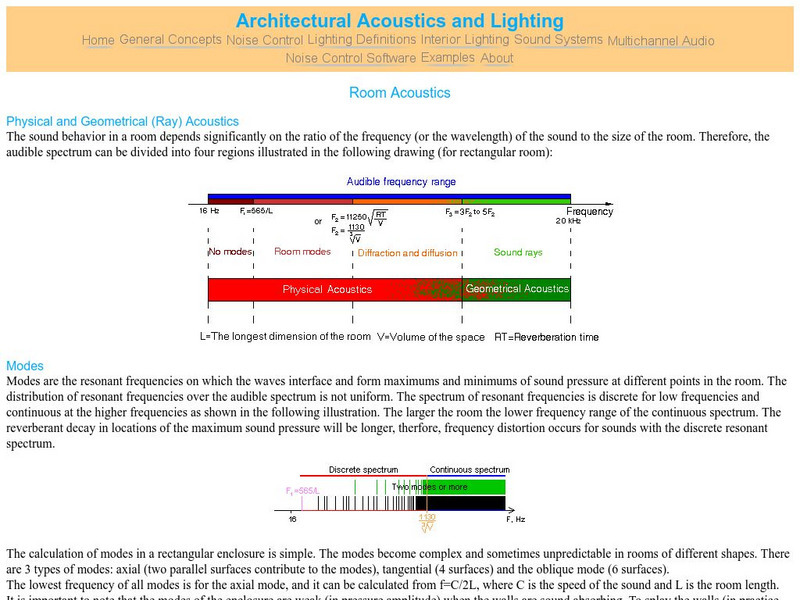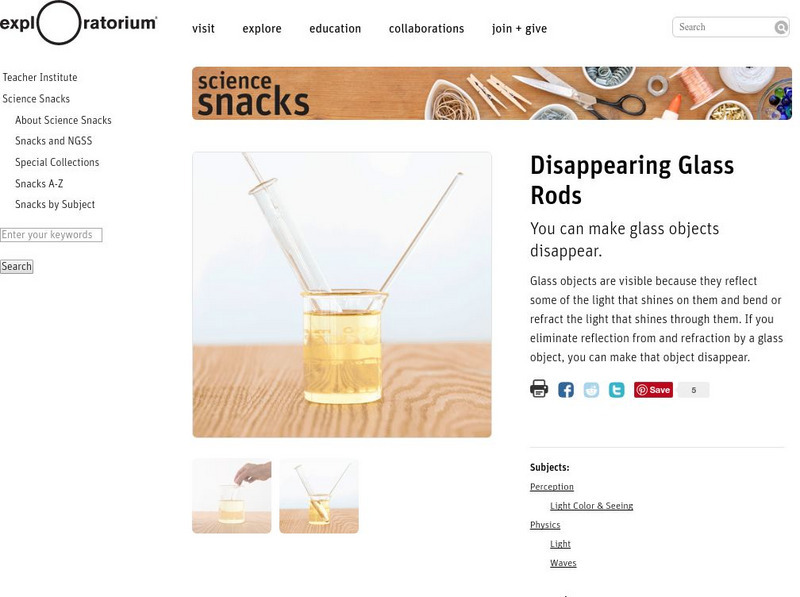Khan Academy
Khan Academy: Eye Disease and Contact Lenses
Punctate keratitis is an eye disease that results in abrasions on the epithelial cornea. One of the leading causes of the disease is the overuse of contact lenses. A research team is investigating the optical properties of four new types...
Physics Classroom
The Physics Classroom: Refraction and Ray Model of Light: The Critical Angle
Illustrated examples and interactive practice problems that introduce students to the concept of the critical angle, the angle of incidence that provides an angle of refraction of 90-degrees.
Optical Society
Optical Society of America: Optics for Kids: Mirrors & the Law of Reflection
A simple activity to investigate how light reflects off a flat surface, a convex one, and a concave one. With a link to an article on reflection.
Science is Fun
Science Is Fun: Floating Soap Bubbles
In this experiment you learn how to generate carbon dioxide inside a container, and float soap bubbles above the gas. Once the bubbles are suspended, it is possible to observe them closely, which is normally very difficult to do....
Physics Classroom
The Physics Classroom: Image Formation for Concave Mirrors Case A
This animation depicts the path of light to each person's eye. Different people are sighting in different directions; yet each person is sighting at the same image location. In this animation the image location is the intersection point...
University of Texas at Austin
The University of Texas Mc Donald Observatory: Mirror, Mirror
In this activity, students test the Law of Reflection based on experimental evidence. However, the back-silvered glass mirrors present a twist and offer them a challenge to work out what happened as the light traveled into and out of the...
Exploratorium
Exploratorium: Science Snacks: Soap Film Interference Model
In this experiment, students construct models of larger red and smaller blue waves on index cards, and use them to investigate how light behaves when it is reflected off the front and the back of soap film.
Exploratorium
Exploratorium: Science Snacks: Soap Film Painting
Investigate the constructive and destructive interference of waves as they reflect off the front and back surfaces of soap film. See what colorful effects can be created on a large, vertical soap film surface where gravity comes into play.
CK-12 Foundation
Ck 12: Physical Science: Refraction
[Free Registration/Login may be required to access all resource tools.] Refraction of light in matter and how light changes its speed and angle of refraction according to the type of medium it is travelling through.
Discovery Education
Discovery Education: Science of Everyday Life: Right Back at You! [Pdf]
What make a good reflective surface? In this lab, students will investigate different surfaces with a reflectivity tester. Lesson plan includes information for students and teachers.
Science and Mathematics Initiative for Learning Enhancement (SMILE)
Smile: Light
For this activity, students actually find the angles of reflection and incidence.
Walter Fendt
Walter Fendt: Reflection and Refraction of Light
Defines the refraction of light and provides an applet for investigating it.
My Science Site
Bj's Science: Discovering the Laws of Reflection [Pdf]
A hands-on science activity for teachers to do to help students explore light reflection.
Other
Lighthouses: Lighting the Lights
A description of the early lights used in lighthouses and how these lights evolved into what they are today. Explains the contributions of Fresnel to the development of these lights; discusses the Fresnel orders.
Other
Architectural Acoustics and Lighting: Room Acoustics
This site from Architectural Acoustics and Lighting provides a discussion of various factors affecting the acoustics of a given room. Room dimensions, the wavelength of the sound wave, the physical characteristics of the walls, the...
Physics Classroom
The Physics Classroom: Polarization
"How Do We Know Light Behaves as a Wave?" An answer is provided in this discussion of the polarization of light and the use of Polaroid filters in sunglasses. The four methods discussed on this page are: polarization by transmission,...
University of New South Wales (Australia)
University of New South Wales: School of Physics: Physclips: Geometrical Optics
Physiclips thoroughly presents geometrical optics concepts like rays, refraction, Snell's law, total internal reflection, dispersion, mirrors, and lenses with animations and film clips.
University of Maryland
Optics Highlights: The Telescope
Part of an anecdotal history of optics and the study of light. Extremely thorough treatment of the invention of the telescope. Includes a short biographical sketch and discusses the work of Isaac Newton which focuses on his contribution...
Open Curriculum
Open Curriculum: Bounded Waves
To understand how bounded waves behave and how reflection of waves affects the wave components.
Better Lesson
Better Lesson: Mira Mira the Amazing Mira
Using a mira, 4th graders draw symmetrical pictures and then explain how the mira works using what they know about reflection and the eye.
My Science Site
Optics: Energy and Control [Pdf]
A very comprehensive unit including topics such as light and its source, visible sources of light, transparency of objects and much more. Also offers a resource list, blackline masters, and expectation list, expectation summary and a...
Physics Classroom
The Physics Classroom: Reflection and Mirrors: Who Can See Who?
Through investigation, discover the fundamental principle used to explain who can see who in a plane mirror, and why this happens.
Exploratorium
Exploratorium: Science Snacks: Disappearing Glass Rods
In this activity, you will make a glass object disappear by eliminating the reflection from and the refraction by the glass object.
Other popular searches
- Light Reflection
- Light Reflection Refraction
- Light Reflection Mirrors
- Light Reflection by Mirror
- Science Light Reflection
- Light Angle of Reflection
- Light Reflection and Color
- Light Reflection and Mirrors
- Light Reflection Projects
- Light and Reflection
- Light Reflection Internet
- Reflection of Light Waves


